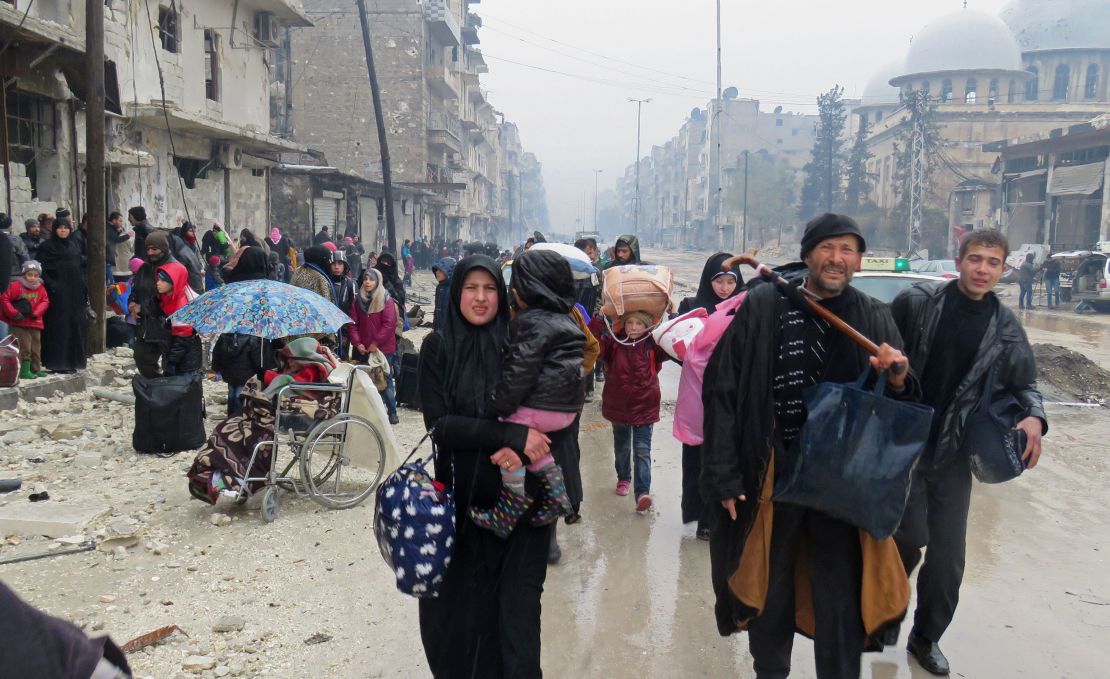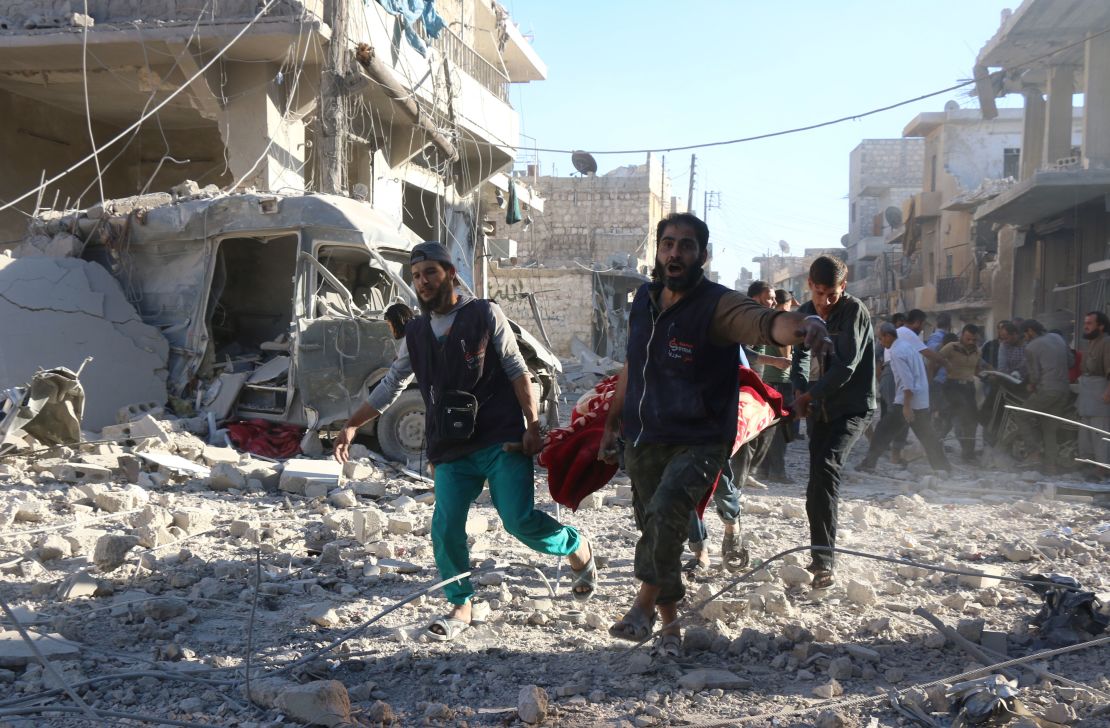Story highlights
Report says Russia and Syria used prohibited cluster munitions
Commission says machine guns fired during aid convoy attack
A UN-established commission has issued a damning report on human rights violations in Syria’s war-ravaged Aleppo, accusing both sides to the conflict of committing war crimes.
The commission gathered evidence to confirm witness accounts that the Syrian and Russian governments used prohibited cluster munitions on civilians in rebel-held eastern Aleppo, suggesting the deliberate destruction of hospitals with repeated airstrikes, among other rights violations.
Cluster munitions release smaller “bomblets” that cover a wider area than regular bombs, and are criticized for causing damage beyond intended targets.
CNN has reached out to Russian officials and the Syrian mission to the UN for a response to the report, but they have not yet replied. Both countries have in the past denied deliberately targeting hospitals and schools, as well as the use of cluster bombs.
The commission could not always distinguish whether it was Syrian or Russian planes carrying out particular airstrikes.
Battle for Aleppo
The report also said Syrian forces carried out a deadly aid convoy attack in September 2016, giving a harrowing account of how machine guns were fired from aircraft at those who had survived rounds of bombings.
The commission heard more witness testimony of chemical attacks using chlorine gas, saying the evidence pointed to the Syrian regime being behind them. The report said the use of chlorine in attacks was a war crime and showed “a blatant disregard for international legal obligations.”
But the commission said it found no evidence that Russia had used chemical weapons.
Both Syria and Russia have denied using chemical weapons.
“On both sides of the city, civilians paid the highest price for the brutality of violence that assailed Aleppo. In eastern Aleppo, pro-government forces pummeled vital civilian infrastructure, with disastrous consequences. Day after day, hospitals, markets, water stations, schools and residential buildings were razed to the ground,” the report said.
It added that civilians in turn avoided hospitals, including pregnant women, “who increasingly gave birth at home without medical assistance or opted for caesareans to avoid hours in labor in hospital.”
“In western Aleppo, civilians lived in fear of indiscriminate and deliberate shelling by armed groups,” the report said, calling such shelling a war crime.

‘Surrender or starve’ siege
The eastern Aleppo enclave had been held by rebel groups for four years when Syrian forces besieged it in July 2016. The commission documented rights violations between this period and late December, when the regime regained control of the area.
The retaking of Aleppo was seen as a major turning point in the war, which has raged for nearly six years.
The government kept a tight grip on the area over those six months, as it and its most powerful ally, Russia, carried out airstrikes over the enclave, reducing much of it to rubble.
The siege cut civilians and armed groups off from much-needed food and aid supplies, a common tactic employed by the regime of Syrian President Bashar al-Assad.
“Resorting to a concerted aerial campaign coupled with ground forces that encircled eastern Aleppo city, government forces and their allies employed brutal tactics to force the armed groups to surrender,” the report said.

“The siege simultaneously deprived civilians of freedom of movement and prevented basic commodities, including food and medical supplies, from entering the city.
“Widely used throughout the conflict, the use of this ‘surrender or starve’ tactic by the pro-government forces has proven disastrous for civilians but successful for overtaking opposition-held territory.”
Machine guns fired in aid convoy attack
The report is one of the most comprehensive official accounts of rights abuses in Aleppo to date.
It also gives the most detailed description of the attack on the UN-led aid convoy on September 19 last year. It said that evidence from the site pointed to the Syrian regime being behind the attack. Russia and Syria both denied carrying out the attack at the time.
The attack, which the report said killed at least 14 civilian aid workers and injured 15 others, led to the suspension of aid deliveries for months.
It destroyed 17 trucks, and with them food, medicine, children’s clothes and other supplies destined for families in western Aleppo areas controlled by armed groups, the report said.
Through accounts from survivors and others in the vicinity of the attack at an aid warehouse, the commission found that helicopters first dropped barrel bombs on the site, striking the warehouse and a family home nearby.

As people rushed to the scene to assist the wounded, they were forced to retreat and seek cover when the helicopters returned and dropped a second round of barrel bombs, before machine guns were fired from the aircraft in their direction.
Survivors described scenes of panic as workers were killed and maimed in the dark in the attack that lasted 30 minutes, the commission found.
The commission also found that the evacuations of civilians form eastern Aleppo in November and December – under a complex people-swap deal that moved civilians and fighters to other areas – constituted a war crime because the agreement was made for strategic reasons, and not for the security of civilians, and it amounted to forced displacement.
Stop weapons sales, commissions says
The commission recommended that the international community support the establishment of a body to investigate war crimes and rights violations in Syria since March 2011, in accordance with a UN resolution.
It also asked countries to curb the supply of weapons to warring parties, “particularly cluster munitions and incendiary weapons, which are indiscriminate when used in civilian-inhabited areas and pose a threat to civilians for years after the cessation of hostilities.”











































